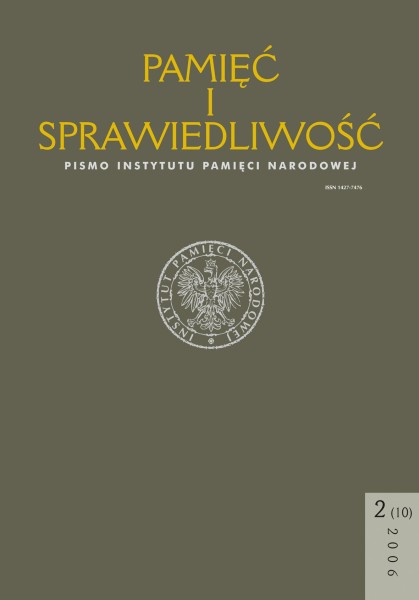Polska 1956–1976: w poszukiwaniu paradygmatu
Pamięć i Sprawiedliwość, Tom 10 Nr 2 (2006), strony: 25-37
Data publikacji: 2006-12-30
Abstrakt
Research into the history of the PRL (People’s Republic of Poland) tends to present the past in the rather simple terms of society versus regime, with the opposing sides being contradictory in their interests and values. Three types of concept prevail: „From One Confl ict to the Next”, „Socialist State, Rebellious Nation”, and the „Totalitarian” perspective. These viewpoints are as superfi cial as their imposed ideological anti-communist perspective. The assumed goal of such historical research is to reveal (to expose, to redress) rather than to understand (to clarify, to explain). To view the modern history of Poland simply in terms of confl ict results in a signifi cant imbalance in examining particular issues. There are examples of monographic work regarding the major social confl icts which
occurred during the lifespan of the PRL, but the periods between these incidents have been less popular.
Although the distinguishable and academically popular Stalinist period in Poland seems to have been suffi ciently researched, the same cannot be said of subsequent decades. It is the years 1956–1976 which deserve attention, for not only was this a „period of conflict” but it was also a time of signifi cant change within Polish society which affected the political system and its perception, the period’s changes impacting on the well documented conflicts.
Important issues regarding Polish society in the second half of the 20th Century have yet to be researched. These include the forming of materialist aspirations, sources of information on the outside world – in particular the possibilities and extent of travel – and the infl uence of the mass media on people’s attitudes. Without an adequate investigation into such issues, bold statements about the system and its dynamics cannot be justified. There remain three main issues – regarding the mechanics of power still widely understood only at a local level – which deserve particular attention: the political culture of the PRL,
the importance of ideology and pragmatism in the decision making process, as well as the activity of interest groups on various levels of authority.
Inne teksty tego samego autora
- Błażej Brzostek, Jerzy Eisler, Dariusz Stola, Grzegorz Waligóra, Wpływ PZPR na zachowania społeczne , Pamięć i Sprawiedliwość: Tom 27 Nr 1 (2016)
- Krzysztof Lesiakowski, Marcin Zaremba, Dariusz Stola, [Recenzja] PRL. Trwanie i zmiana, red. Dariusz Stola i Marcin Zaremba, Wyższa Szkoła Przedsiębiorczości i Zarządzania im. Leona Koźmińskiego, Warszawa 2003, ss. 424 , Pamięć i Sprawiedliwość: Tom 4 Nr 2 (2003)
- Krzysztof Kosiński, Błażej Brzostek, Krzysztof Kosiński, Wiwisekcja powszedniości. Studium wczesnej twórczości Marka Nowakowskiego (1957–1971), Instytut Pamięci Narodowej, Warszawa 2014, 559 s. , Pamięć i Sprawiedliwość: Tom 26 Nr 2 (2015)
 Język Polski
Język Polski
 English
English
 Deutsch
Deutsch
 Français (France)
Français (France)
 Italiano
Italiano
 Русский
Русский


 PDF
PDF
